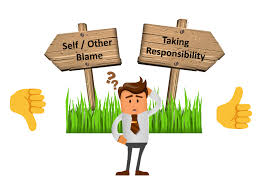A major part of my burnout recovery and stress management journey has been learning how to hold myself accountable.
I spent a great deal of time and energy blaming other people – basically anyone but myself – for mistakes, procrastination, and failures.
If I was late: it was the traffic, not my poor planning.
If I was frustrated: it was because someone else didn’t do their part, not because of my poor communication or procrastination.
If I failed: it was because someone else screwed up or got in my way, not because I wasn’t prepared.
Recently, I had to spend a solid six months fixing a mistake with my business taxes. It was my mistake for letting something lapse, a report, that needed to be turned in annually. I forgot about the report because of my own disorganization.
I spent some time in denial before actually taking action, then got frustrated at the state for their convoluted instructions, got pissed about having to stay on hold with government agencies or call back several times, and made sure my husband knew how incompetent our state government is.
In the end, everything got filed and fixed – but it took a lot of extra time and energy.
However, at the end of the day, the only person to blame was myself.
Accountability As a Habit
Accountability has been a touchy subject in my burnout recovery and stress management practice. When you’re chronically stressed you have tunnel vision and really only see negativity and mistakes. Primarily other people’s mistakes.
We feel like the world is doing things to us and we lack the control to stop it.
The hard truth is: We just don’t want to do the work that it would take to control and stop it. It would take time and effort, difficult conversations with others, admitting our own faults, and we fear what could happen next.
It’s just easier to point the finger at someone else.
Or, so we think.
When I accepted responsibility for my crappy attitude, my procrastination habits, and the chaos that my perfectionism and people pleasing tendencies create – my life got a lot easier.
It got easier because I wasn’t battling the guilt, shame, and fear that took over with every excuse I concocted for a mistake or failure.
While taking accountability for yourself seems like a lot of stress and pressure, a lot of that stress and pressure comes from shame, judgement, guilt, and fear. You don’t want to make a mistake, disappoint anyone, or break your word.
What Taking Accountability Actually Means
When I say the word accountability, many people react with, “So everything is my fault?”
No.
Accountability is the willingness to take responsibility for one’s words, actions, and outcomes. You acknowledge your role and its effect on the outcome. It involves accepting the consequences of your choices, taking ownership of your actions, and learning from your mistakes. It requires you to be honest with yourself about your own feelings and actions.
It also means you fulfill your obligations, tasks, and goals without excuses. If an unexpected challenge comes your way, you focus on a solution without pointing fingers.
Accountability doesn’t mean you only take responsibility for the bad stuff, but also the good stuff, the successes.
In fact, someone who doesn’t take accountability often skips sharing, owning, and celebrating their successes and wins.
Being an accountable person is the foundation of personal and professional development because it allows you to foster trust, build stronger relationships, and promote integrity. It empowers you to make meaningful changes and gain a better understanding of yourself and the world around you.
Do You Avoid Accountability?
How do you know if you are just making excuses and pointing fingers, rather than taking responsibility at the right time? See if you show any of these five symptoms of avoiding accountability?
- Blaming others: Reacting defensively or shifting blame onto others when faced with challenges or failures. You’re always the victim.
- Excuses and denial: Making justifications or denying any personal responsibility for the consequences of our actions.
- Procrastination: Delaying tasks or avoiding taking action due to fear of failure or being held accountable.
- Lack of goal-setting: Failing to set clear goals or not following through with commitments. D
- Resistance to feedback: Reacting negatively to constructive criticism or refusing to accept input from others.
I admit, I showed every single one of these symptoms when I was struggling with burnout.
Tips for Learning to Hold Yourself Accountable
Holding myself accountable wasn’t easy at first. I didn’t like owning my mistakes and failures. It seemed easier to point the finger at someone else every time I encountered an obstacle.
I now realize that my lack of understanding of what accountability actually means, as well as, letting go of my perfectionist and people pleasing tendencies makes the process a lot easier.
I’ve noticed that becoming an accountable person has improved my confidence, kept me focused on growing and learning, motivated me, and I have a greater sense of control over my life.
Tips for Learning to Hold Yourself Accountable:
- Start small: Don’t expect to become a self-accountability expert overnight.
- Be honest: It’s critical that you are honest about your own thoughts and behavior, and how they affect your life and outcomes you expect.
- Set goals: Goal-setting forces you to own what you set out to do, so think carefully about what you want to accomplish. Goals can help you avoid procrastination and measure how close you are to meeting your standards.
- Create a schedule and use your time wisely: A schedule provides a sense of control over your time and energy. It allows you to plan based on your priorities and keep yourself from overcommitting.
- Reward yourself: Celebrate milestones and accomplishments – no matter how small. By celebrating, you keep yourself focused and positive.
- Have an accountability partner: Someone that you trust and will be honest with you about your thoughts and behavior. They will remind you of your dreams and get you back on track when stray.
- Seek feedback: Actively seeking feedback (with an open mind and without judgement from you) can help you improve your performance and become more skilled.
- Don’t overcommit: Be mindful of your current obligations so that you don’t put yourself in a situation where you could drop the ball, be late, or not be able to fulfill the commitment at all.
- Take time to reflect: When you win and when you lose, take the time to think about your role in the moment. Learn how you affected the outcome so you don’t repeat a mistake or continue to contribute positively.






